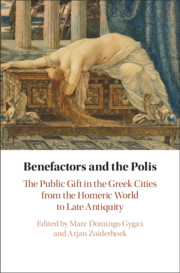 Benefactors and the Polis
Benefactors and the Polis from Part III - Hellenistic Benefactors
Published online by Cambridge University Press: 21 January 2021
This chapter argues that euergetism in Hellenistic poleis was not just a form of benefaction securing kings and wealthy members of the polis symbolic capital, legitimacy and a superior place in the social hierarchy of poleis, but also a means of community building and social peace. The well-known habit of Hellenistic political communities to publish endowment decrees and the regulations concerning their legal execution on stone not only ensured that the assets dedicated to a particular purpose were not poorly managed, embezzled or transferred to another purpose. They were also public monuments of the democratic control over private wealth and its public display. Demonstrating that the people held ultimate power over the smooth running of public endowments, these decrees guaranteed and made visible the democratic commitment to their ‘eternal’ existence, and at the same time propagated the effectiveness of democratic institutions among the whole citizen body as well as vis-à-vis individual wealthy benefactors.
To save this book to your Kindle, first ensure no-reply@cambridge.org is added to your Approved Personal Document E-mail List under your Personal Document Settings on the Manage Your Content and Devices page of your Amazon account. Then enter the ‘name’ part of your Kindle email address below. Find out more about saving to your Kindle.
Note you can select to save to either the @free.kindle.com or @kindle.com variations. ‘@free.kindle.com’ emails are free but can only be saved to your device when it is connected to wi-fi. ‘@kindle.com’ emails can be delivered even when you are not connected to wi-fi, but note that service fees apply.
Find out more about the Kindle Personal Document Service.
To save content items to your account, please confirm that you agree to abide by our usage policies. If this is the first time you use this feature, you will be asked to authorise Cambridge Core to connect with your account. Find out more about saving content to Dropbox.
To save content items to your account, please confirm that you agree to abide by our usage policies. If this is the first time you use this feature, you will be asked to authorise Cambridge Core to connect with your account. Find out more about saving content to Google Drive.